If you’ve come across this blog post, chances are you’re either searching for a way to support your own cancer diagnosis and treatment plan with mushrooms, or you’re looking for cancer treatment support for a loved one.
Either way, we first want to say that we’re sorry you’re going through this and we’re here to help you with any information we have available to us at this time.
The truth is, mushrooms have been used for centuries by Eastern world cultures for both folk and traditional medicinal uses.
These cultures have used mushrooms to treat everything from inflammatory diseases to, yes, you guessed it, cancer.
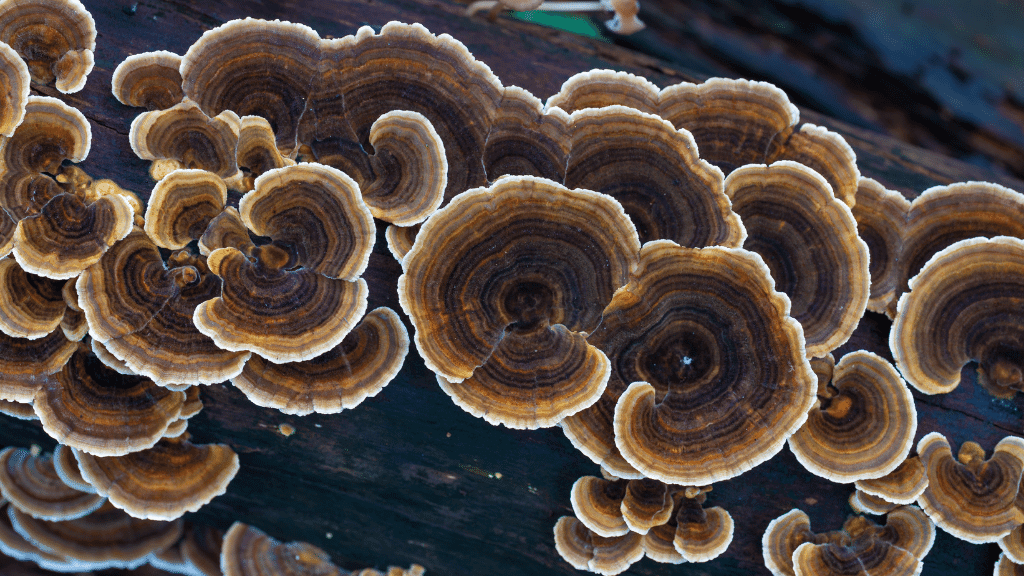
In this blog post, we’re covering the who, what, when, where, why, and how of utilizing various medicinal mushroom species to support the treatment of an oncology diagnosis – we’ll share the top mushrooms used for cancer support, look at clinical studies, and more.
Let’s take a look.
Criteria for being a cancer-support mushroom
Important disclaimer: Prior to diving into the nitty gritty of this blog post, we wanted to add a quick disclaimer about what mushrooms are included in this blog post and why. As mentioned prior, medicinal mushrooms have been utilized in traditional medicine for hundreds of years and the ones included in this blog post have a long history of use. All mushrooms listed in this post are high in beta-glucan content and have supporting clinical trials to back up claims for cancer care. Before assuming that a specific mushroom type is the best for your own or a loved one’s health regimen, please talk to your doctor and discuss your options.
Many people call medicinal mushrooms immune modulators and adjuvant agents in cancer treatment. Various types of medicinal mushrooms have been found to modify tumor response and improve immune function for cancer patients. This is mainly due to the mushroom’s biologically active polysaccharides in their fruiting bodies and/or mycelium (the jury is still out on which one is best - but we tend to lean fruiting body).
These bioactive compounds are found in many mushrooms. But some mushrooms contain higher amounts of immune-boosting compounds than others.
The top five mushrooms for cancer support
Today, the top mushrooms for cancer support are:
- Turkey tail
- Reishi
- Shiitake
- Chaga
- Split gill
These mushrooms are sometimes taken alone as a supplement but are oftentimes taken alongside traditional chemotherapy to help improve the efficacy of the treatment. Many of these mushrooms have actually been approved as a cancer supplemental treatment for over 30 years in Asian countries.
Why are these mushrooms used for cancer support?
Well, as mentioned earlier, they are high in beta-glucan and antioxidant content, which are clinically shown to be good for boosting the immune system when undergoing extreme treatments or disease (e.g., chemotherapy and cancer). Let’s look at those compounds a little closer:
Cancer support compounds in mushrooms
Mushrooms have long been regarded for their unique makeup of helpful compounds - most notably for their PSK and beta-glucan content.
We’ll get to beta-glucans in detail in a bit (see below), but first we wanted to share all of the cancer support compounds commonly found in medicinal mushrooms.
The other bioactive compounds shown to help improve the body’s immune response to cancer and cancer-related tumors, include:
- Proteins
- Lectin
- Triterpenes
- Lipids
- Phenolic compounds
For example, chaga mushrooms typically are high in betulinic acid, which is a powerful anti-cancer remedy. Additionally, split gill mushrooms contain sizofiran which may enhance the effectiveness of radiation or chemotherapy in various cancer types.
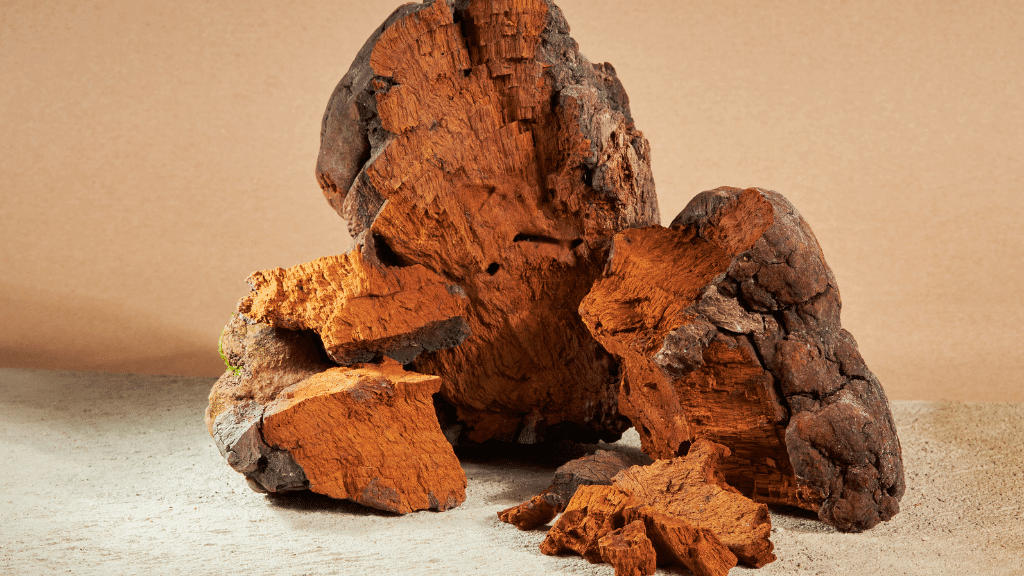
These compounds can help aid the beta-glucans in boosting the immune response to foreign invaders in the body, giving the person who is consuming the mushroom supplements a better fighting chance at keeping a strong immune response throughout cancer treatment.
Let’s now take a look at the unsung (or sung, actually) hero of medicinal mushrooms for cancer support: beta-glucans.
What are beta-glucans? Why do they matter for cancer support?
Beta-glucans are a fiber found in the cell walls of various living organisms, including yeast, bacteria, fungi (like mushrooms), algae (like seaweed), and other plants.
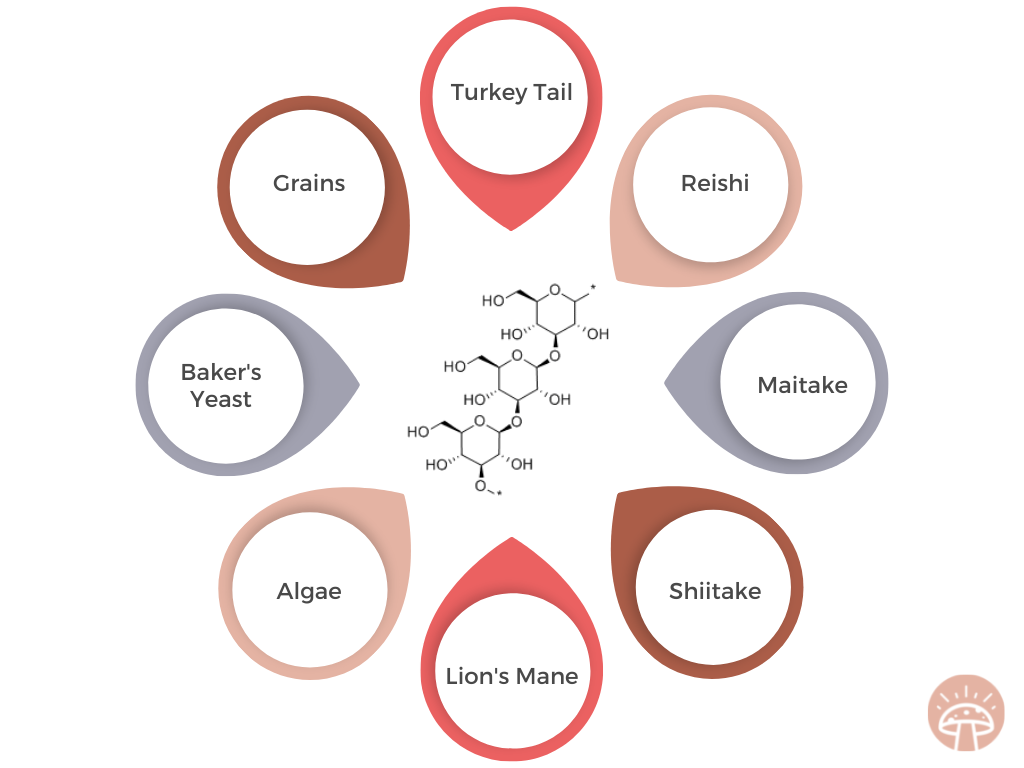
The plants that contain them utilize them as a source of energy to power the organism. What’s unique about beta-glucans is that they are biologically active and have been shown in various studies to play a role in potential health benefits.
The health benefits of beta-glucans are still undergoing studies, and potential use cases for medicinal mushrooms that contain a high level of beta-glucans are growing daily.
Most notably for this topic, beta-glucan research has found that when broken down properly by the human body, these tiny fibers can help boost the immune system.
For example, in a 2020 study published in Molecular Nutrition and Food Research, researchers found that beta-glucans have antioxidant properties and are potent immunomodulators (e.g., increase white blood cell count in the human body).
This makes beta-glucans a strong defense function against immune threats. Furthermore, the study of beta-glucans has been shown to stimulate the creation of immune cells such as macrophages, neutrophils, and monocytes.
Mushrooms with the highest beta-glucan content:
- Turkey tail: 60.8% beta-glucan content by weight in the cap
- Reishi: 54.0% beta-glucan content by weight in the cap
- Shiitake: 25.3% beta-glucan content in the stalk
Not too shabby, eh?
Now that you see the value of beta-glucans, we’re going to share a bit more about each of these specific types of mushrooms and how they’ve been shown to help with cancer support.
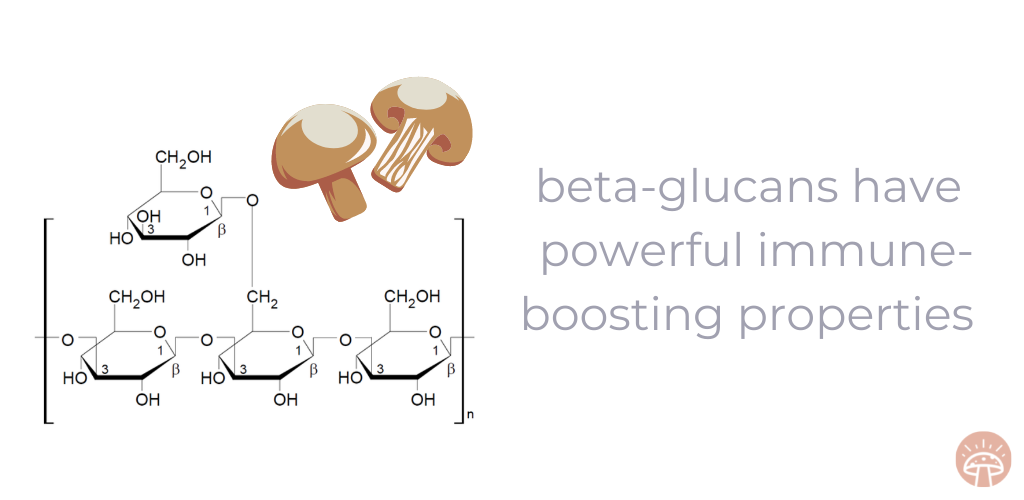
And if you want to dive a lot deeper on beta-glucans, we have some information that’s right up your alley - check it out.
Potential cancer support benefits of turkey tail
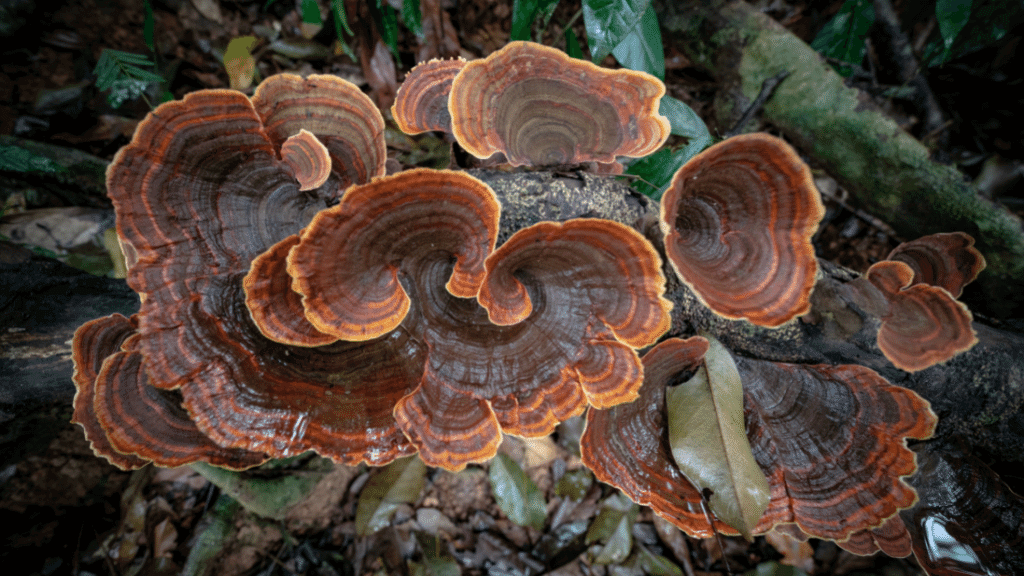
Turkey tail mushrooms are a multicolored mushroom that is named for, well, looking like a turkey tail. They grow wild on tree trunks and fallen trees in various wooded places around the world, and are considered the most well-documented and highly tested mushroom. Since it’s so highly tested, turkey tail has been shown to be a powerful addition to use alongside traditional cancer treatment and prevention therapies.
Today, we have access to over 40 studies that include tens of thousands of participants, showing that it’s a valuable supplement for cancer. These studies have shown that turkey tail mushrooms contain high levels of cancer-fighting beta-glucans and antioxidants - because of this high saturation of nutrients, the mushroom has also shown to have positive benefits for cancer patients.
In 1983, Polysaccharide-K (PSK) extract derived from turkey tail mushrooms was approved by the Chinese government as a vital addition to traditional chemotherapy treatment.
This work is still regarded as a huge turning point for cancer treatment research today.
PSK is mentioned in numerous immuno-oncology studies, as it’s been recognized for its positive role in helping aid the body’s defenses against cancers including gastric cancer, breast cancer, colorectal cancer, and lung cancer.
Clinical studies are ongoing on PSK/turkey tail mushroom linkages to cancer care. As we learn more and start to understand how natural therapies can be used alongside traditional cancer treatments, medicinal mushrooms are really earning their spot at the table in this conversation.
So, with all of this information in mind, what makes turkey tail the *arguably* most popular cancer-fighting mushroom to take as a supplement?
Why are turkey tail mushrooms great for cancer support?
- Antioxidants
- The highest percentage of beta-glucans (more than 50% of the mushroom’s makeup) of all mushrooms
- Polysaccharopeptides (PSK), including krestin and polysaccharide peptide (PSP), that are shown to boost the body’s immune response
- Triterpenes: Part of the mushroom membrane, triterpenes act as precursors to natural steroids
- Sterols: These hormone precursors convert to vitamin D2 when exposed to sunlight
- Polyphenols (e.g., flavonoids): This naturally occurring compound is produced in response to environmental stressors and associated with positive benefits when consumed regularly
- Vitamins and minerals: Selenium, vitamin B3, and vitamin D have all been shown in the makeup of turkey tail mushrooms
This nutrient-dense makeup is what makes turkey tail not only a great potential treatment supplement for cancer and chemotherapy, but also just overall health and wellbeing on a daily basis.
Learn more about taking turkey tail mushrooms for cancer by checking out our dedicated blog post on the subject.
Potential cancer support benefits of reishi
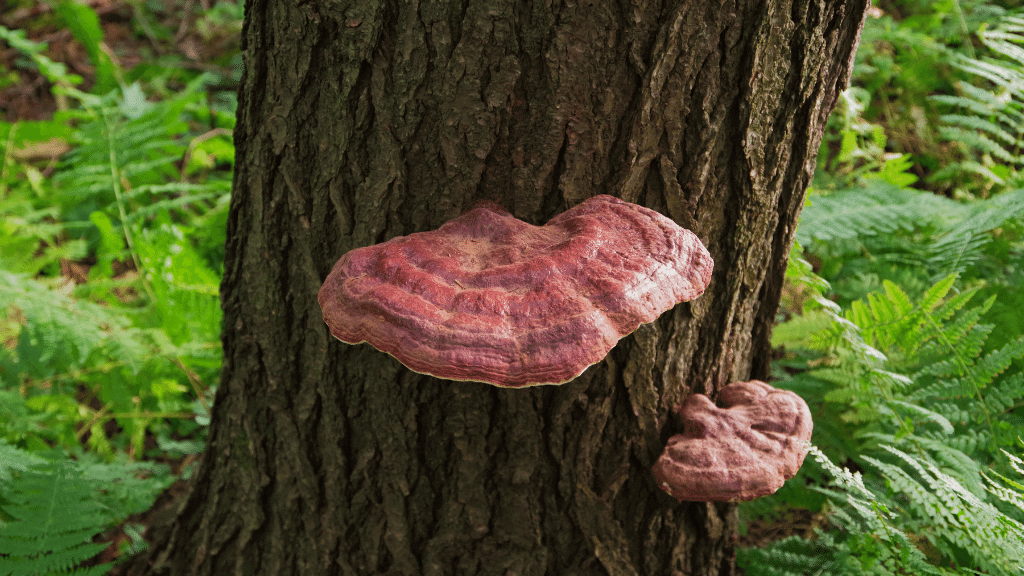
Traditionally, reishi has been used in Chinese medicine for more than 2,000 years as an anti-aging tonic and was thought to bring good luck and fortune to those who found and consumed it.
But today, we’re adding to these beliefs by bringing *science* into the mix.
Reishi has a lot of functional health benefits that have been widely studied, including improved immune function, better sleep, and improved fertility.
In 1980, numerous studies came out on reishi that evaluated the powerful polysaccharides found in this mushroom for possible anti-tumor effects and supportive properties for brain dysfunction. Today there are 24+ clinical trials in the works to study reishi, making it one of the most prominent and well-studied medicinal mushrooms over the coming years alongside turkey tail.
These studies encompass a variety of research including possible treatments for cancer, colitis, Parkinson's and overall immune function.
But for the purposes of this article, we’ll focus on cancer studies.
Lab research and preclinical trials have suggested that reishi has promising anticancer and immunomodulatory properties.
Cancer-related studies for reishi mushrooms:
- HUMAN STUDY: In one human study, the polysaccharides from reishi mushrooms enhanced the immune responses in patients with advanced-stage cancer. Clinical evaluations of response and toxicity are ongoing.
- DOUBLE-BLIND HUMAN TRIAL: More pre-clinical findings also weigh in on Reishi and its ability to stimulate and boost the immune system during chemotherapy. “We enrolled 82 participants across 8 cancer centers in China. The median age was 59 years, 56 (68%) had advanced cancer. Compared with the placebo group, the RPF group had nonstatistically significant higher quality of life as measured by the FACT-L total score (P = .086) over 2 cycles of chemotherapy.”
- It’s also good to note that reishi can increase the activity of a white blood cell that is known as natural killer (NK) cells, and has been spoken about as a “search and destroy” property for cancer cells. NK cells have been studied for their support of fighting infection and shielding our bodies against tumors.
While more research needs to be done, reishi is one of the few mushrooms with a world of research already completed and is at the top of the list for the best of the functional mushrooms.
Learn more about the potential cancer-fighting compounds of reishi mushrooms by checking out our various blog posts.
Potential cancer support benefits of shiitake
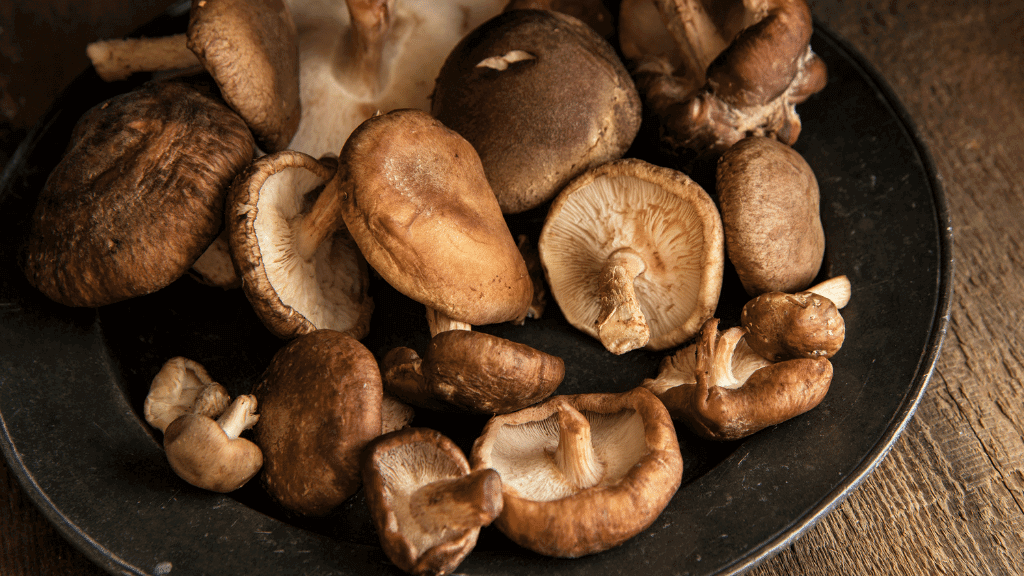
Shiitake mushrooms are the second most widely cultivated mushroom in the world behind button mushrooms. Shiitake typically grows on hardwood trees in forests and, when conditions are right, can fruit for over seven years on the same log.
Shiitake is primarily thought of for its delicious taste as an excellent addition to meals – but in more recent years Western cultures have started to catch up to the Eastern world (Japanese and Chinese cultures, mostly) to revere shiitake for its potential health benefits.
Its healthful properties, including lentinan (a purified beta-glucan), fiber, and eritadenine, are a few of the reasons shiitake is known for being a cancer support mushroom supplement today. Letinan and beta-glucans are the most widely researched immunomodulating components in medicinal mushrooms.
There have been numerous studies completed, and many that are still ongoing, about the potential benefits of taking shiitake mushrooms for immunology, anti cancer effects, prevention of viral and bacterial infections, cardiovascular support, cholesterol reduction, blood sugar regulation, and liver health.
For the purposes of this article, we’ll be focusing on the immune and cancer effects of this mushroom, but we couldn’t help but note it’s a healthy living powerhouse that is multi-functional.
Cancer related studies for shiitake mushrooms:
- MICE STUDY: In a study that measured the effectiveness of shiitake mushroom supplementation on the most prominent type of liver cancer, hepatocellular carcinoma, scientists found letanin to be a viable treatment for combination therapy alongside chemo.
- HUMAN STUDY: In a study on the growth of tumors when taking shiitake supplements, scientists found that 50 mg per day helped slow the tumor growth by over 50%.
- MICE STUDY: Five types of polysaccharides isolated from shiitake mushroom fruiting bodies were shown to have antitumor tendencies in mice.
- IN-VITRO STUDY: As mentioned earlier, letinan is shown to trigger positive immune response in the body. In this study, letinan was shown to slow tumor growth for affected cells - specifically for colon cancer cells.
While more studies are needed on human subjects to confirm validity of shiitake mushrooms for medicinal purposes, there is a growing body of evidence to suggest that this species is so much more than just a delicious kitchen delicacy.
For more information on the potential health benefits of shiitake mushrooms, check out our blog.
Potential cancer support benefits of chaga
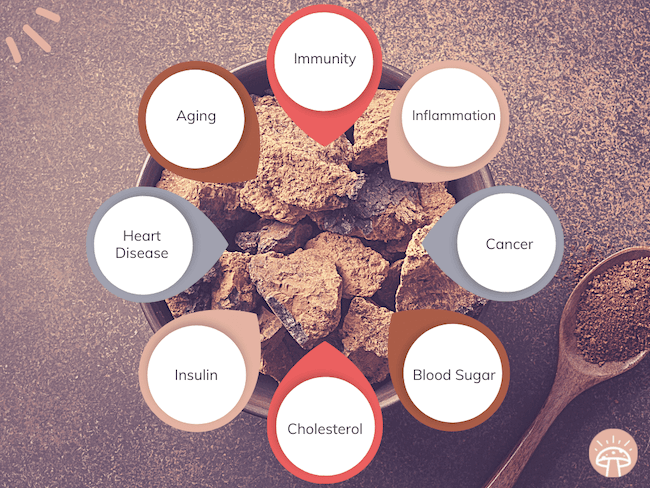
Chaga, one of the more popular and well-known medicinal mushrooms, has been used by Eastern populations to treat various health needs for generations. In recent years, the popularity of chaga mushrooms has gained traction in Western cultures as well.
Chaga can be found growing on birch tree trunks and resembles burnt charcoal in the form of a nutrient-rich growth from the wood called “conk”. The conk averages about 10-15 inches in size, and, although the dark black, rough exterior of the chaga is considered aesthetically ugly by many, the mushroom has a soft, orange colored inner core and is proven to contain numerous nutrients.
The nutrients found in chaga, namely beta-glucans, triterpenes, and phenolic compounds resulting from the darkly-colored conk, have been shown to boost the immune system and fight off various cancers. It’s been shown that chaga mushrooms promote the formation of beneficial cytokines (e.g., specialized proteins that regulate the immune system) that stimulate white blood cell count to fight off harmful bacteria or viruses.
Some studies have shown the presence of these beneficial compounds have also helped fight off cancer.
Cancer-related studies for chaga mushrooms:
- IN-VITRO STUDY: This study showed that chaga mushrooms can prevent and slow cancer growth.
- MICE STUDY: A study on mice showed that chaga mushroom supplementation helped slow cancer tumor growth by 60%.
- IN-VITRO STUDY: Lastly, a study showed that chaga was a viable supplemental treatment alongside chemotherapy for hepatoma (liver cancer).
To help better explain why chaga was having these beneficial effects in various studies, one study looked at the antioxidant properties found in chaga and found that these compounds helped protect cells from free radical damage.
Please note that there needs to be more studies completed on humans to further validate the claims about chaga for cancer care, but initial findings show a promising future for the mushroom in the science world.
Want to learn more about the health benefits of chaga? Check out our blog post to dive deeper into this seemingly ugly, but highly healthful mushroom.
Potential cancer support benefits of split gill
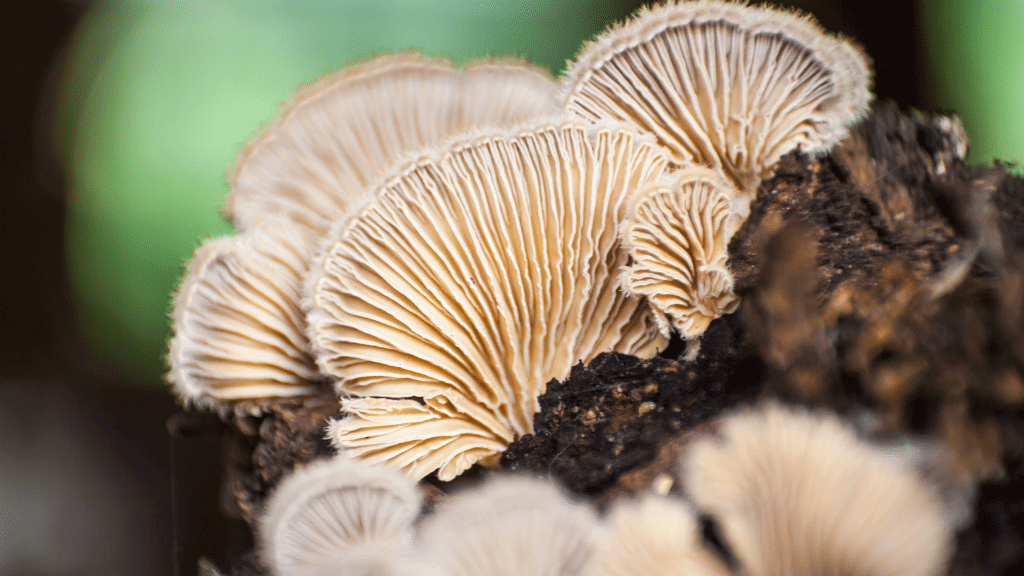
Split gill mushrooms are one of the more unique looking mushrooms as they grow in shelves without stalks - many say they even resemble an underwater coral. This mushroom got its name from the divided gills found under the cap’s underside. Found in many Asian forests growing on trees or rotten logs, split gill mushrooms have long been regarded as a traditional food item and are often found sold at open air markets across the region. However, in recent years, studies on this mushroom have found split gill to be a viable treatment for tumors, various viruses, immunotherapy needs, and cancer.
What makes split gill mushrooms more than just a kitchen delicacy? Well, it’s been found that split gill mushrooms contain fungal beta-glucans called schizophyllan (a.k.a. sizofiran).
Over 150 research papers have linked this split gill compound to antitumor, anti cancer, and antimicrobial effects when taken appropriately due to its ability to increase natural killer (NK) cells in the body.
One of the most promising human studies linked sizofiran extract consumption to counteracting neutropenia (e.g., helping boost white blood cell count), making it a potentially great supplement to take while undergoing chemotherapy.
Let’s take a look at a few of the other notable studies linking split gill mushrooms to cancer support.
Cancer-related studies using split gill mushrooms:
- HUMAN STUDY: In a 1992 study, 52 Japanese medical institutes looked at 292 patients with cervical cancer (stages II-III). Each of these patients was given 40 mg of split gill mushroom supplement weekly and eventually progressed to 20 mg twice a week along with chemotherapy. 91% of stage II patients receiving both chemotherapy and supplementation were shown to have almost all cancer signs of cancer gone at the end of the study. Similar results were shown among other groups that received both radiation and supplementation. In this study, it was also shown that the survival rate among those that received both split gill supplementation and radiation was higher as compared to those that just received radiation.
- MICE STUDY: In a study that looked at the immune response of mice receiving lectin taken from the fruiting bodies of split gill mushrooms, potent immune response was found across the study, especially toward tumor cell lines.
The above, in particular, shows that taking split gill mushrooms are a potentially great option for those undergoing chemotherapy treatment to improve immune response, increase life expectancy, and improve efficacy of the treatment. However, more studies are being done as we speak and we need more information to validate these clauses. Please check with your doctor to ensure this is the right choice for you before diving head first into split gill supplement purchases.
For more information on split gill mushroom health benefits and potential safety concerns, check out this article.
The proper dosage of mushrooms for cancer support
Whew, that was a lot.
But thanks for sticking with us through all of that information.
If you’d made it here, you’re likely interested in learning a bit more about dosage recommendations.
Please note that dosage will differ person-to-person based on size, health status, gender, and more. Always consult your doctor before taking supplements to support cancer treatment.
If you’ve gotten the “ok” from your doctor, the typical recommended dose of medicinal mushroom for immune support is 6-9 grams a day for the mushrooms noted in this blog post (that’s just about equivalent to 1 teaspoon).
Some sources recommend up to 15-25 grams a day for active cancers, but this is an important thing to discuss with a trusted health professional. These doses were administered under careful observation in studies and trials - not all of which were human trials.
Higher doses also have the potential for toxicity, although this is rare. But the potential for toxicity and drug interactions does exist. See the side effects section for more detail.
Remember that mushrooms need to be heated and extracted in order to get full access to the beta-glucans and other medicinal compounds. Make your mushroom powder as a steeped tea or buy trusted extracts which have already been processed for you.
For more information on extraction processes, check out our blog post.
Potential interactions & side effects
When taking any supplement, it’s important to understand what your body can handle within the existing framework (e.g., your health status, existing ailments, etc.) – this is especially important when treating something as serious as cancer.
Many mushrooms, such as wild chaga, contain oxalates - a natural substance found in plants that, when consumed in high doses, may cause kidney stones/kidney toxicity.
For example, in a study conducted on a 72 year old Japanese woman with a history of liver cancer, after taking 5 teaspoons of chaga power in hot water daily (a very high dosage), the oxalate crystals eventually caused kidney damage. T
o help avoid this issue, consider taking your supplements with a high soluble milk product that is filled with calcium.
In short, toxicity becomes a concern at higher dosage points. To avoid toxicity of the kidneys, consider the dosage of any mushroom supplement before you automatically move toward a higher amount daily.
Interactions with any of the above mushrooms may differ. Please consult your doctor or our additional blog resources for more information about each species’ potential interactions.
Taking mushroom supplements
With cancer being such a serious diagnosis, it’s always (always, always, always) recommended to work with a specialist, pharmacist, and your doctor to discuss your mushroom supplementation options before undergoing treatment and supplementation side-by-side.
For more information about the various types of supplements, check out this helpful blog post.
A final word on mushrooms and cancer support
We know you’re navigating a lot right now during this difficult time. Whether you’re researching for yourself or a loved one - we’re sending so mush love to you as you navigate mushroom supplementation for cancer care.
Please reach out if you have further questions and we’ll do our best to answer them.

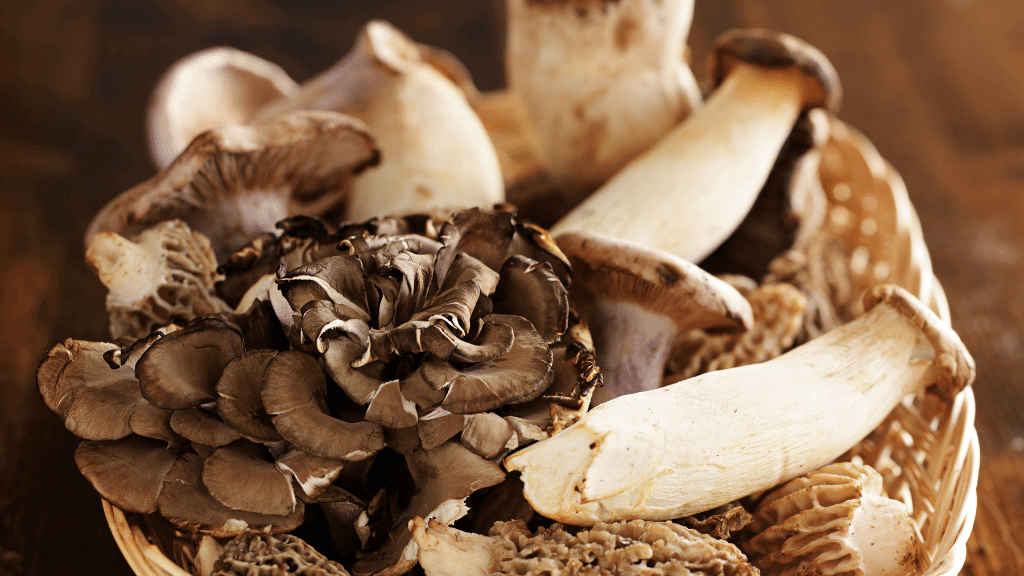
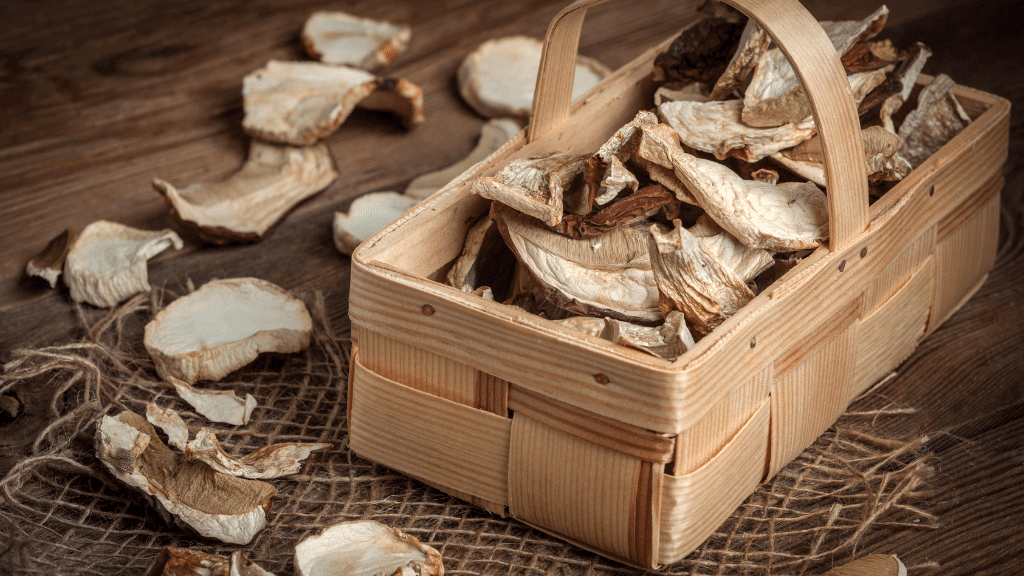


.png)
